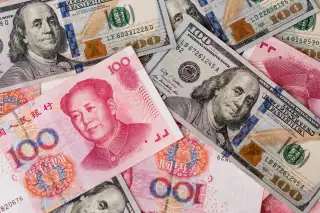Why China's Currency Has Been Knocking Down U.S. Stocks

On Tuesday and again on Wednesday, the Chinese yuan declined in value. For most currencies trading on international markets, that wouldn't be news. But the Chinese government normally keeps its currency's value pegged to the U.S. dollar, so the surprise drop set off a wave of selling in global stock markets. The S&P 500 fell 20 points, or about 1%, on Tuesday and was down another 1.1% in Wednesday morning trading.
Why does a decision in Beijing about about how many yuan a dollar can buy send down the price of U.S. companies? And is there anything you should doing about it with your own investments? Here are some answers.
The currency move reinforces anxiety that Chinese growth is slowing down fast.
China is allowing its currency to devalue in an apparent bid to boost its exports—by making its products cheaper for foreign consumers to buy—and keep its growth on track. Global markets don't like it when one of the world's most important economies starts looking a little panicked. And there's been plenty of chaos in China already.
As Money's Paul Lim writes in the upcoming issue:
As the world’s second-largest economy, China is expected to drive global growth as it continues its transition from a manufacturing-based economy to a consumer-driven one. It turns out, though, to have a terrible problem with financial bubbles.
In the year up to mid-June, the Shanghai Composite Index shot up 150%, as Chinese investors hoping to make up for losses in a recent real estate downturn poured into the stock market, many of them for the first time. They had unrealistic expectations: The market has since slammed into reverse, falling by a third in less than a month and wiping away $4 trillion in wealth….
The real issue is whether the financial panic will cause households to curtail spending and put the brakes on China’s GDP growth, which is already down to 6.5%, off from earlier forecasts of 8%.
Although 6.5% growth sounds like an impressive feat—highly developed economies are considered strong when they hit 3%—its a comedown from expectations. Since China is a huge consumer of commodities, oil prices are tumbling. And global companies selling in China are expecting a hit to sales.
A weaker yuan means a stronger dollar—and that's not great news right now.
A strong dollar is, on the one hand, a sign of the U.S. economy's relative strength. But for American companies exporting to the rest of the world, it means they are less competitive on price. Already, the trade deficit—the gap between what we export and what we import—has been growing. And Fed chair Janet Yellen has been citing the strong dollar as one drag on the slowly recovering U.S. economy.
It may change the math on whether U.S. stocks are reasonably priced or overvalued—but it's not clear how.
As the Wall Street Journal notes today, all of this comes at a time when many American investors are jittery anyway. We've been in a long bull market, and stocks look a bit expensive by some measures. Currently, says the WSJ, the S&P 500 trades at about 18 times the past year of earnings, above the average of just under 16 for the past decade. Worries that China's slowdown will hit corporate earnings could make investors less willing to pay up for stocks.
But weighing against that is another factor. Slow growth in China and a stronger dollar may persuade the Federal Reserve to hold off on raising short-term interest rates, and already seems to have bond investors betting on lower long-term interest rates. Bonds are rallying, with investors accepting yields of less than 2.1% on 10-year Treasuries. In a low-rate environment, when it is hard for investors to earn a high return on safer investments like bonds, they are often more willing to pay higher valuations for stocks, since the alternative is so unappealing. The slow-growth, low-rate story that many believe has pushed up stock valuations could be reinforced for a while by the slowing of the Chinese economy.